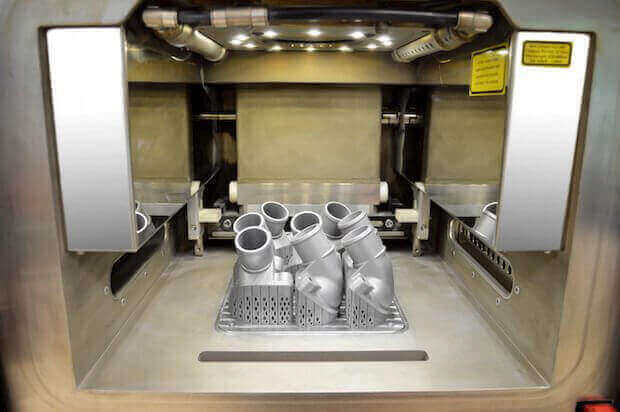Mercedes-Benz Trucks announces that its first metal 3D printed spare part, a thermostat cover, has passed the quality assurance process.
After repeatedly hinting that 3D printing technology would play a major role in the Mercedes-Benz production process, the German car manufacturer finally preparing its first metal 3D printed part.
Earlier this week, Mercedes-Benz Trucks revealed that its 3D printed thermostat cover passed its stringent quality assurance process. This makes it the first metal 3D printed spare part that the automotive company will implement into its vehicles. The component is designed for trucks and Unimog models from older model series.
Don’t Miss: Mercedes-Benz Trucks 3D Printing Spare Parts on Demand
By passing the quality assurance process, this thermostat cover pushes Mercedes-Benz to the forefront of automotive innovation. The next step will be to implement this metal 3D printed component into the high-end car manufacturer’s vehicles.

Mercedes-Benz Trucks Plans Implementation of Metal 3D Printed Part
Metal 3D printing technology offers a number of benefits to the production of spare car parts. Printed in aluminum material, the thermostat cover provides 100 percent more density and greater purity than die-cast aluminum parts.
Additionally, the component boasts increased strength and durability over conventional manufacturing. It also doesn’t hurt that metal additive manufacturing eliminates the need for special tooling and costly development work.
Andreas Deuschle, Head of Marketing & Operations in Customer Services & Parts at Mercedez-Benz trucks, says:
“With the introduction of 3D metal printing technology, Mercedes-Benz Trucks is reasserting its pioneering role among the global commercial vehicle manufacturers. We ensure the same functionality, reliability, durability, and cost-effectiveness with 3D metal parts as we do with conventionally produced parts.”
While the thermostat cover might be the first 3D printed part to pass Mercedes-Benz’s quality assurance testing, it likely won’t be the last. The company hopes to use additive manufacturing to produce peripheral engine parts, in-engine parts, cooling system components, transmissions, axles, and the chassis.
According to Deuschle, another advantage of this metal 3D printed thermostat cover is the ability to showcase it visitors. Now, when a customer needs this particular spare part, Mercedes will be able to print it on demand. This will equal faster and cheaper production, two factors that will undoubtedly please customers.

Source: TCT Magazine
License: The text of "Mercedes-Benz Reveals First Metal 3D Printed Truck Part" by All3DP is licensed under a Creative Commons Attribution 4.0 International License.